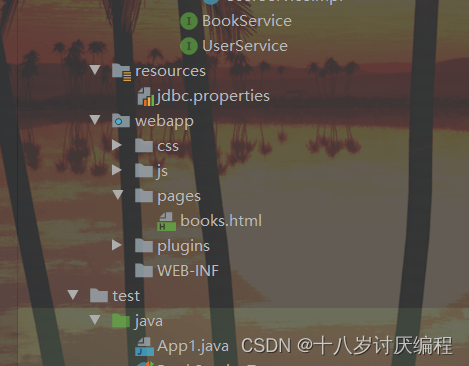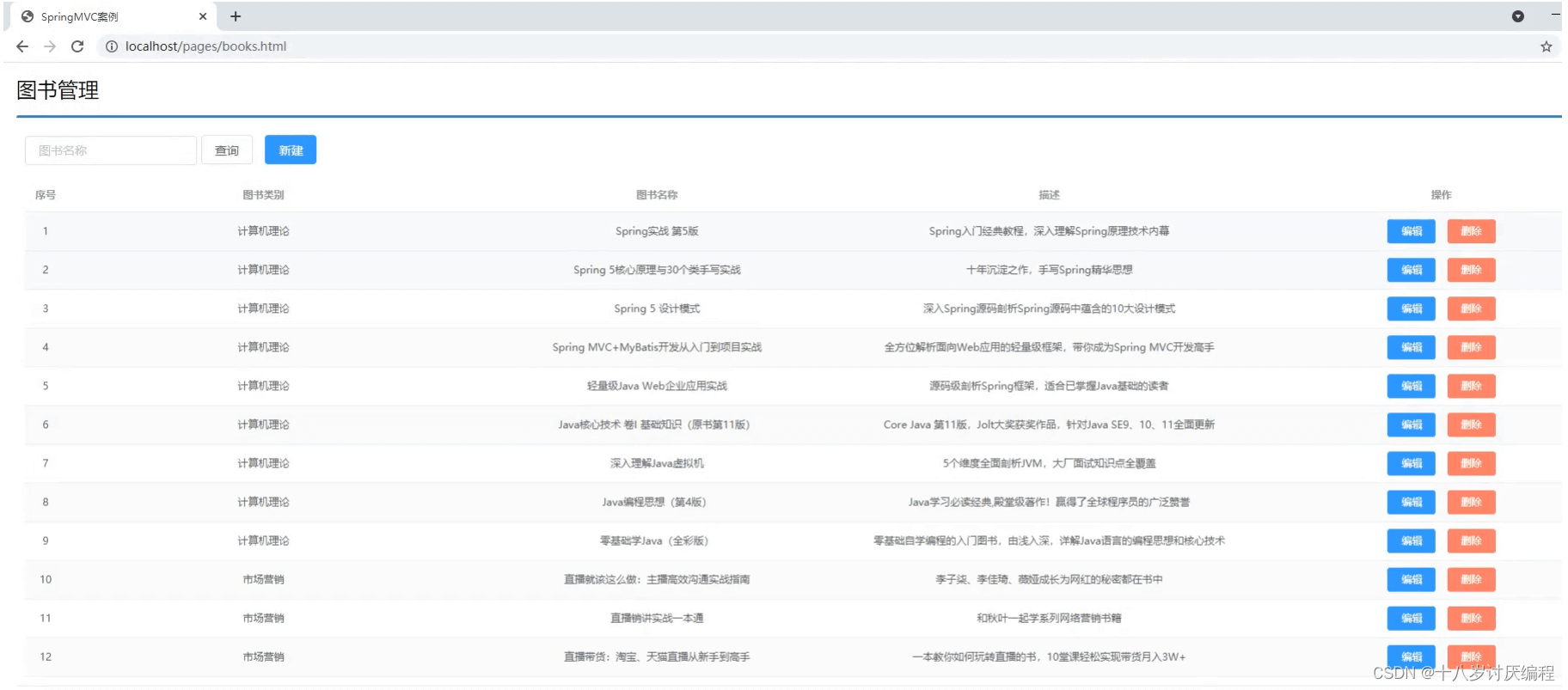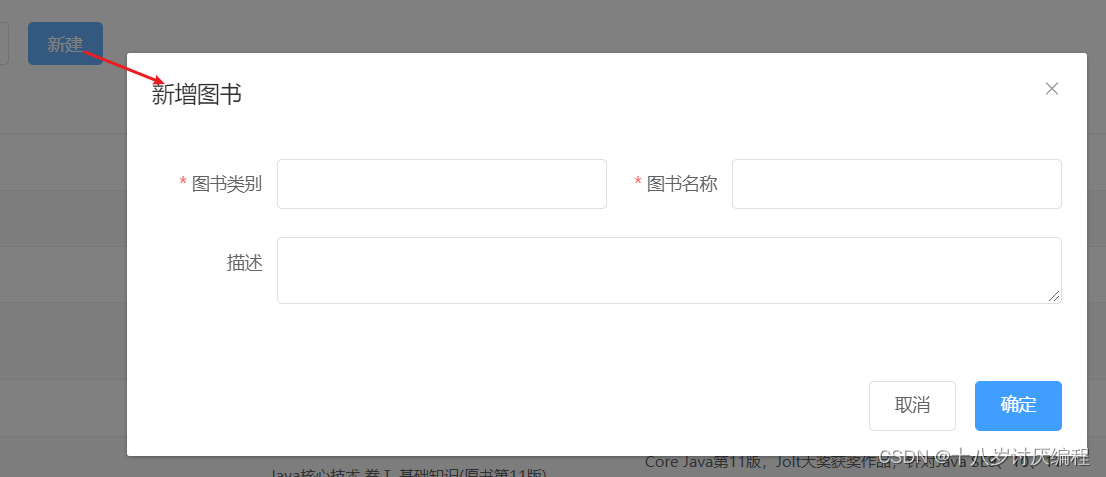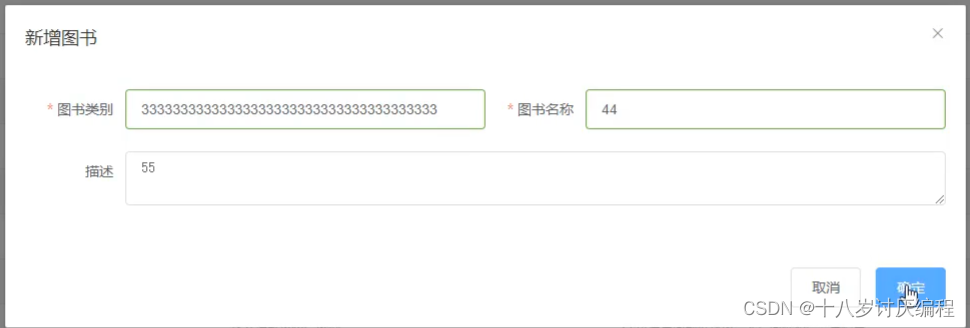Java SSM实现前后端协议联调详解上篇
目录
- 环境准备
- 列表功能
- 添加功能
- 添加功能状态处理
环境准备
项目结构与前文相同:

我们添加新的静态资源:

因为添加了静态资源,SpringMVC会拦截,所有需要在SpringConfig的配置类中将静态资源进行放行:
我们新建SpringMvcSupport
@Configuration
public class SpringMvcSupport extends WebMvcConfigurationSupport {
@Override
protected void addResourceHandlers(ResourceHandlerRegistry registry) {
registry.addResourceHandler("/pages/**").addResourceLocations("/pages/");
registry.addResourceHandler("/css/**").addResourceLocations("/css/");
registry.addResourceHandler("/js/**").addResourceLocations("/js/");
registry.addResourceHandler("/plugins/**").addResourceLocations("/plugins/");
}
}
配置完成后,我们要在SpringMvcConfig中扫描SpringMvcSupport:
@Configuration
@ComponentScan({"com.nefu.controller","com.nefu.config"})
@EnableWebMvc
public class SpringMvcConfig {
}
接下来我们就需要将所有的列表查询、新增、修改、删除等功能一个个来实现下。
列表功能

需求:页面加载完后发送异步请求到后台获取列表数据进行展示。
- 找到页面的钩子函数,
created() created()方法中调用了this.getAll()方法- 在getAll()方法中使用axios发送异步请求从后台获取数据
- 访问的路径为
http://localhost/books - 返回数据
返回数据res.data的内容如下:
{
"data": [
{
"id": 1,
"type": "计算机理论",
"name": "Spring实战 第五版",
"description": "Spring入门经典教程,深入理解Spring原理技术内幕"
},
{
"id": 2,
"type": "计算机理论",
"name": "Spring 5核心原理与30个类手写实践",
"description": "十年沉淀之作,手写Spring精华思想"
},...
],
"code": 20041,
"msg": ""
}
发送方式:
getAll() {
//发送ajax请求
axios.get("/books").then((res)=>{
this.dataList = res.data.data;
});
}

添加功能

需求:完成图片的新增功能模块
- 找到页面上的新建按钮,按钮上绑定了
@click="handleCreate()"方法 - 在method中找到
handleCreate方法,方法中打开新增面板 - 新增面板中找到确定按钮,按钮上绑定了
@click="handleAdd()"方法 - 在method中找到
handleAdd方法 - 在方法中发送请求和数据,响应成功后将新增面板关闭并重新查询数据
handleCreate打开新增面板
handleCreate() {
this.dialogFormVisible = true;
},
handleAdd方法发送异步请求并携带数据
handleAdd () {
//发送ajax请求
//this.formData是表单中的数据,最后是一个json数据
axios.post("/books",this.formData).then((res)=>{
this.dialogFormVisible = false;
this.getAll();
});
}
添加功能状态处理
基础的新增功能已经完成,但是还有一些问题需要解决下:
需求:新增成功是关闭面板,重新查询数据,那么新增失败以后该如何处理?
1.在handlerAdd方法中根据后台返回的数据来进行不同的处理
2.如果后台返回的是成功,则提示成功信息,并关闭面板
3.如果后台返回的是失败,则提示错误信息
(1)修改前端页面
handleAdd () {
//发送ajax请求
axios.post("/books",this.formData).then((res)=>{
//如果操作成功,关闭弹层,显示数据
if(res.data.code == 20011){
this.dialogFormVisible = false;
this.$message.success("添加成功");
}else if(res.data.code == 20010){
this.$message.error("添加失败");
}else{
this.$message.error(res.data.msg);
}
}).finally(()=>{
this.getAll();
});
}
(2)后台返回操作结果,将Dao层的增删改方法返回值从void改成int
public interface BookDao {
// @Insert("insert into tbl_book values(null,#{type},#{name},#{description})")
@Insert("insert into tbl_book (type,name,description) values(#{type},#{name},#{description})")
public int save(Book book);
@Update("update tbl_book set type = #{type}, name = #{name}, description = #{description} where id = #{id}")
public int update(Book book);
@Delete("delete from tbl_book where id = #{id}")
public int delete(Integer id);
@Select("select * from tbl_book where id = #{id}")
public Book getById(Integer id);
@Select("select * from tbl_book")
public List<Book> getAll();
}
(3)在BookServiceImpl中,增删改方法根据DAO的返回值来决定返回true/false
@Service
public class BookServiceImpl implements BookService {
@Autowired
private BookDao bookDao;
public boolean save(Book book) {
return bookDao.save(book) > 0;
}
public boolean update(Book book) {
return bookDao.update(book) > 0;
}
public boolean delete(Integer id) {
return bookDao.delete(id) > 0;
}
public Book getById(Integer id) {
if(id == 1){
throw new BusinessException(Code.BUSINESS_ERR,"请不要使用你的技术挑战我的耐性!");
}
// //将可能出现的异常进行包装,转换成自定义异常
// try{
// int i = 1/0;
// }catch (Exception e){
// throw new SystemException(Code.SYSTEM_TIMEOUT_ERR,"服务器访问超时,请重试!",e);
// }
return bookDao.getById(id);
}
public List<Book> getAll() {
return bookDao.getAll();
}
}
(4)测试错误情况,将图书类别长度设置超出范围即可

处理完新增后,会发现新增还存在一个问题,
新增成功后,再次点击新增按钮会发现之前的数据还存在,这个时候就需要在新增的时候将表单内容清空。
resetForm(){
this.formData = {};
}
handleCreate() {
this.dialogFormVisible = true;
this.resetForm();
}
到此这篇关于Java SSM实现前后端协议联调详解上篇的文章就介绍到这了,更多相关Java前后端协议联调内容请搜索我们以前的文章或继续浏览下面的相关文章希望大家以后多多支持我们!

